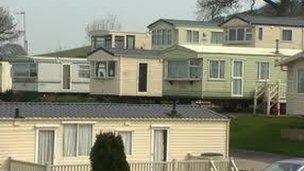Reduced 'caravan tax' still causing industry concern
- Published

Static caravans are now subject to 5% VAT rather than the 20% rate announced in the 2012 Budget
Caravan manufacturers are hoping the introduction of VAT on static caravans will not lead to a downturn in sales.
From 6 April, VAT will be charged on static caravans at a rate of 5%.
The so-called 'caravan tax' caused controversy when it was first unveiled in the 2012 Budget at a rate of 20%.
Treasury officials said the measure was designed to address a 'tax anomaly' - which meant VAT was levied on touring caravans, but not on static caravans.
The caravan industry lobbied against the introduction of VAT on static models and the rate was eventually reduced from 20% to 5%.
Impact of VAT
Andrew Percy was one of a number of Conservative MPs to oppose the 'caravan tax'.
The MP for Brigg and Goole said: "Obviously it would be better if it was 0%, but the industry was perfectly clear at the time that 5% would have a limited impact, if any."
The British caravan industry is centred on Hull and the East Riding of Yorkshire, where 95% of models are produced.
The managing director of Victory Leisure Homes, Peter Nevitt, claimed it would be difficult for manufacturers to absorb the extra cost of introducing VAT.
Mr Nevitt said: "Anything that increases the retail selling price of the caravans is hard to take. The 5% VAT is something we could have done without."
Holiday park sales
Thousands of static caravans are bought and sold at holiday parks in coastal towns across the UK.
Park bosses fear the introduction of VAT could deter many static caravan owners from trading in their old models.
The manager of Skegness Water Leisure Park, John Chappell, said: "If you buy a new caravan and decide later you want to sell it, then there will be VAT payable on the used caravan as well as on new sales."
The caravan industry was hoping for a last-minute bounce in sales before the introduction of VAT.
However, many holiday parks claim the freezing spring weather deterred would-be buyers from purchasing new static caravans over the Easter holidays.